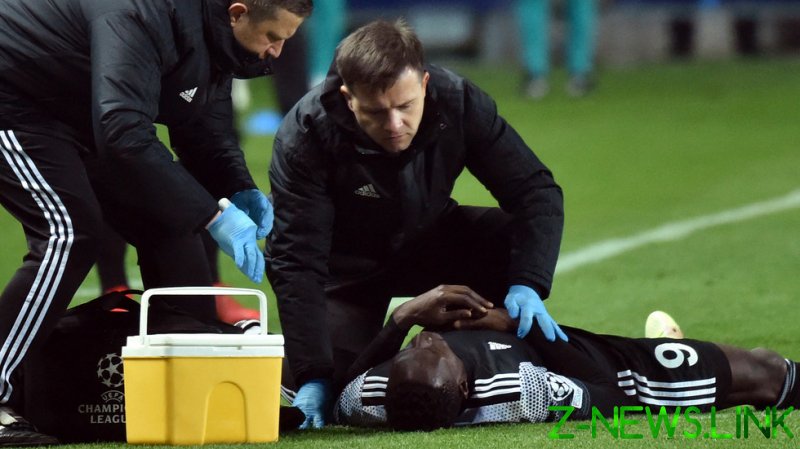
This week brought more disturbing news for football. On Wednesday night, Adama Traore of Sheriff Tiraspol fell to the ground while clutching at his chest during the Champions League game with Real Madrid. The Malian winger remained conscious and was eventually helped off the pitch, although there have been no further reports on what caused the worrying incident.
In England’s second-tier Championship on Tuesday, there were similar fears when Sheffield United player John Fleck crumpled to the ground during a match with Reading. The Scotland international received around 10 minutes of medical treatment before being helped off the pitch, also being given oxygen. The 30-year-old was taken to hospital but has since been released.
On Thursday, Charlie Wyke of English third-tier team Wigan Athletic collapsed during training. The 28-year-old is said to be stable in hospital, but no further details on his condition have been given after the club requested privacy for the player and his family.
The three cases within the space of a week are merely the latest to trouble football circles.
Even bigger news at the end of October involved Barcelona forward Sergio Aguero. The Argentine pulled up during a La Liga game against Alaves, suffering from chest pains and complaining of dizziness.
Initial reports said that Aguero had been diagnosed with a heart arrhythmia and would be out for at least three months, although it has since been suggested that the 33-year-old could be forced to retire from the game.
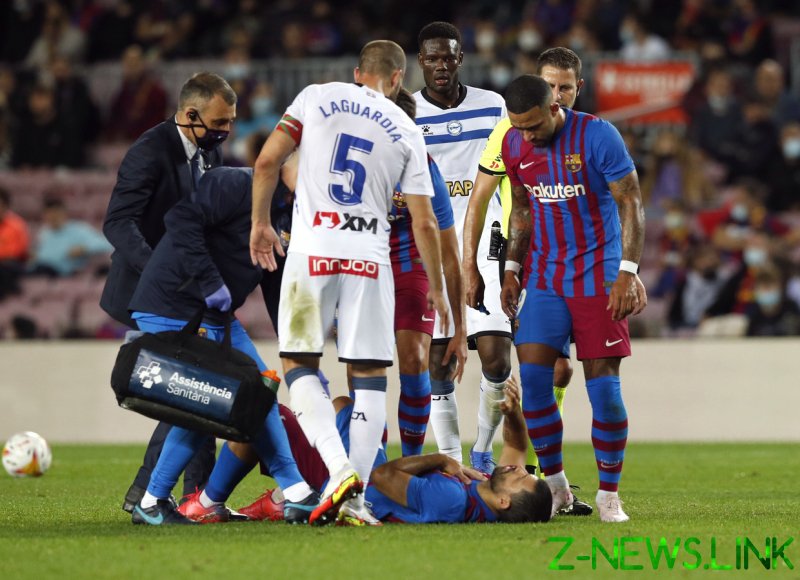 Aguero required assistance before being helped off the pitch. © Reuters
Aguero required assistance before being helped off the pitch. © ReutersThe highest-profile case of all in recent months – and arguably the most harrowingly public – came at the European Championships during the summer, when Denmark midfielder Christian Eriksen went into cardiac arrest during the match with Finland.
Eriksen’s life was saved by the quick-thinking actions of teammates, match officials and medics. He has since been fitted with a heart-starting device (ICD), but significant doubts remain as to whether the talented playmaker will ever be seen in competitive action on a football pitch again. Eriksen is just 29 years old.
 Christian Eriksen came through his ordeal in the summer. © Reuters
Christian Eriksen came through his ordeal in the summer. © ReutersThe rash of cases and the context of the pandemic in which they have occurred has thrown up obvious questions concerning Covid and the vaccines rolled out to combat it. This week, former England striker Trevor Sinclair openly asked if vaccines were to blame, promptly being shut down as a result. Others have likewise done so.
For anyone vaccine hesitant or outright anti-vaxx, it perhaps seems an obvious question to ask.
Doctors, though, have dismissed that idea in numerous places. The Telegraph recently shared the thoughts of Professor Keith Neal, a specialist in the research of the epidemiology of infectious diseases at the University of Nottingham. He said it was “totally irresponsible to make these unsubstantiated comments, as opposed to getting them properly dealt with.”
Fellow specialist Professor Robert Dingwall echoed those sentiments, saying: “It may be tempting to blame Covid vaccines, but pundits do have a public responsibility not to fuel vaccine hesitancy without any real evidence that this is a common factor in widely separated events.”
Elsewhere, scientists have said that Covid itself was more likely a cause of footballers suffering heart problems than the vaccines aimed at combatting the disease.
Tellingly, Wigan released a statement after the collapse of Wyke to dismiss the idea that vaccines played a part in his health scare. “With Charlie’s approval, we can confirm that Charlie has not received a Covid-19 vaccination and Charlie’s collapse was not related to any Covid-19 vaccination,” the club said.
Rumors had swirled during the summer that Eriksen’s case was vaccine-related, prompting officials from his club Inter Milan to shut down the speculation. “He didn’t have Covid and wasn’t vaccinated either,” Inter director Giuseppe Marotta said at the time.
Speaking to The Daily Mail, leading cardiologist Professor Guido Pieles has argued that the recent cluster of heart scare cases among footballers is more a “coincidence” than anything else.
“I don’t think we can say this is suddenly increasing, I don’t think it is increasing particularly in football,” he said.
“Footballers are certainly not the athletes that have the highest volume and intensity of training. Endurance runners, Tour de France cyclists, and rowers they train much longer hours.
“It cannot be said that in the last year or two years they train more but over the last 10 years that is true.
“The game has got faster but also people are fitter. If you play football in the Premier League, you have done this since seven or eight years old.”
The issue was similarly covered in a piece by The Athletic’s Daniel Taylor earlier this month, in which it was reckoned that a man collapses on a football pitch somewhere once every four days. Cases with tragic endings have included the death of 17-year-old Dylan Rich during an English FA Youth Cup tie in September.
One of the world’s leading cardiologists, Professor Sanjay Sharma, told The Athletic that we are seeing a “statistical cluster”.
“There are lots of reasons it looks like it’s going up. First, footballers are much more in tune with their cardiac health than they ever were. They have watched… the Eriksen episode and many of these players are concerned something like this could happen to them. Many of them have witnessed these cardiac arrests.
“Players are much more likely now to complain of a cardiac problem than ever before. Aguero, for example. He didn’t have a cardiac arrest but he clearly had a cardiac symptom that caused him to stop playing instead of thinking, ‘Gosh, I don’t know what that is, I will just carry on and see if it goes.’”
Sharma cautioned that people should not point the finger at Covid jabs, saying: “For me to say the vaccine could be implicated would be the most irresponsible thing in the world.”
Indeed, he pointed to another possible reason being the intensity of the modern game and the demands placed on players at the highest level.
Likewise, the new head of the influential Professional Footballers’ Association (PFA) in England and Wales, Maheta Molango, said earlier this month players were being treated like robots.
“This is not a shoe factory,” Molango told The BBC. “You’re talking about human beings and sometimes I get the feeling that we are moving in the direction that footballers are just machines and they are not.”
The likes of Manchester City manager Pep Guardiola and Liverpool boss Jurgen Klopp are just two of the names to question the number and frequency of matches during the season.
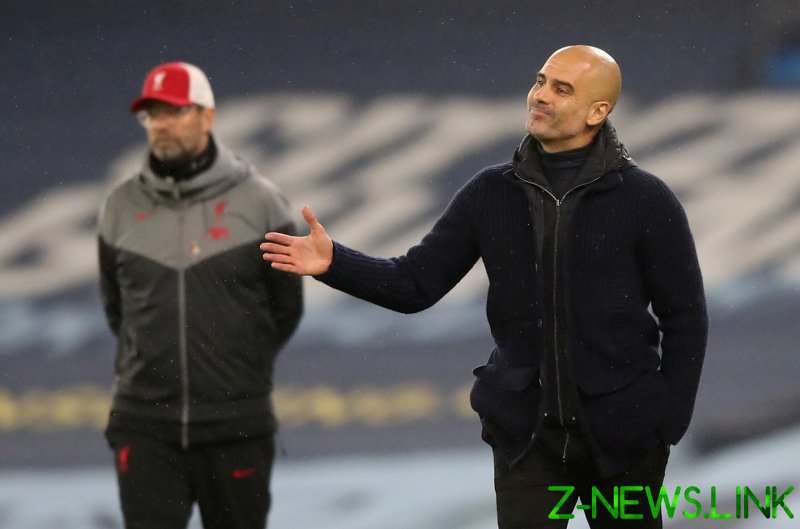 Klopp and Guardiola have both said players are being pushed too hard. © Reuters
Klopp and Guardiola have both said players are being pushed too hard. © ReutersSocial media also means that stories of players collapsing from as far and wide as Africa to Iceland can reach far more people these days, perhaps fueling concerns or making cases seem more frequent now than they were in the past.
One man who knows first-hand the terrifying experience of suffering a cardiac arrest on the football pitch is former Bolton Wanderers player Fabrice Muamba.
Then aged just 23, he collapsed in harrowing scenes during the first half of an FA Cup match with Tottenham in 2012, and it was later revealed that his heart had stopped functioning properly for a full 78 minutes. His survival was dubbed a “miracle”.
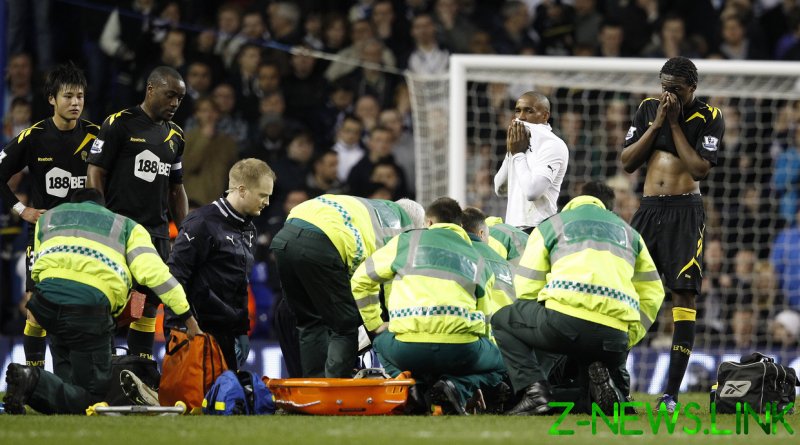 Muamba survived his harrowing ordeal almost a decade ago. © Reuters
Muamba survived his harrowing ordeal almost a decade ago. © Reuters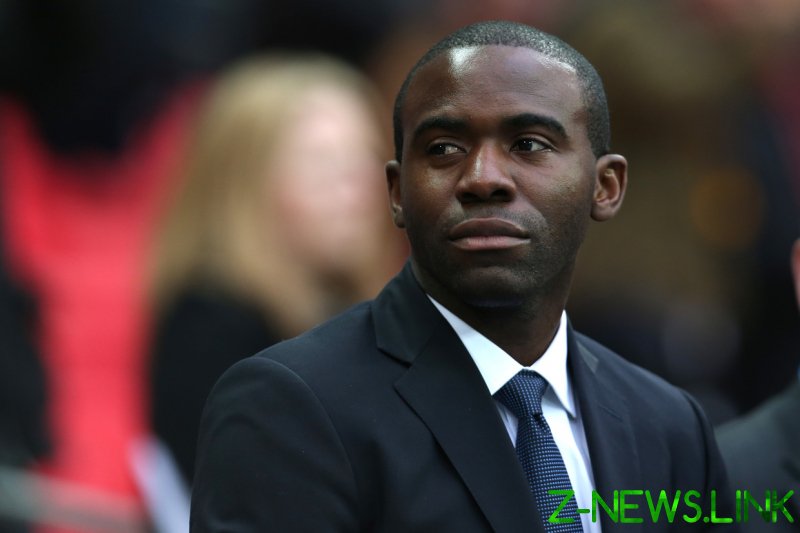 Muamba lived to tell the tale and promotes better awareness of players’ heart health. © Reuters
Muamba lived to tell the tale and promotes better awareness of players’ heart health. © ReutersUnsurprisingly, Muamba was forced to retire from professional football, but has remained active in promoting players’ well-being – including in the wake of recent incidents.
“There’s a complacency about it. We have a high-profile incident, talk a lot about it and think we have solved it but that’s not the case,” Muamba told The Mail regarding players’ cardiological health.
“We are supposed to be the fittest of the fittest but it’s happening more frequently now. If it can happen to them it can happen to anybody else.”
After more concerning news this week, even more demands will be heaped on football to learn lessons and safeguard players’ health as best it can.
The statements, views and opinions expressed in this column are solely those of the author and do not necessarily represent those of RT.
© 2021, paradox. All rights reserved.





